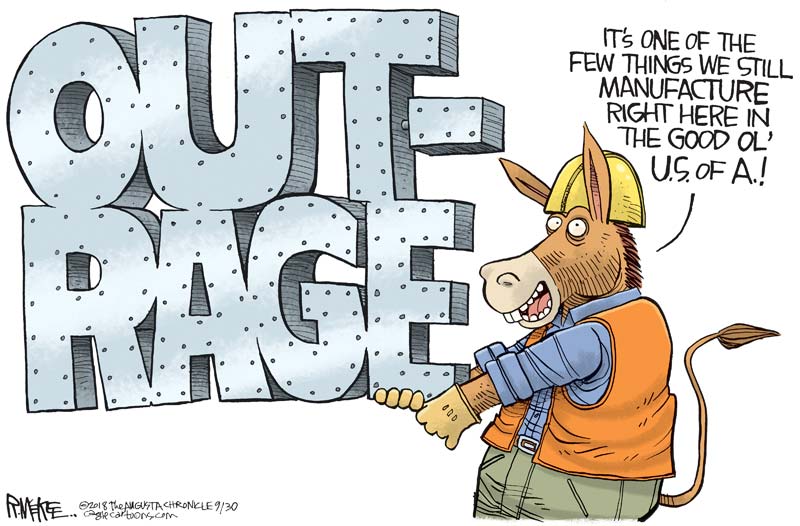
The leak was indeed outrageous, and it will damage the court's standing in our political system, as well as the inner workings of the court. As the court-watching SCOTUSblog noted, "It's impossible to overstate the earthquake this will cause inside the Court, in terms of the destruction of trust among the Justices and staff. This leak is the gravest, most unforgivable sin." Added George Washington University law professor Jonathan Turley: "The [Politico] article represents the greatest crisis that Chief Justice John Roberts has faced in his tenure on the Court."
The substance of the decision is, of course, historic. Roe has been law for 49 years. If the decision holds — remember that the leaked draft is, in fact, a draft, and votes and positions could change — the abortion question will return to the states and to state legislatures. At least 26 states have signaled they plan to outlaw abortion. Other states will legalize it, and some will make efforts to attract abortion-seeking women from states that have outlawed it. In short, overturning Roe will have far-reaching effects in American life.
But as important as that is, the political consequences could be even greater, for this reason: The decision will turbocharge existing Democratic and progressive anger at two critical checks on majority rule that are built into our constitutional system: the Electoral College, by which presidents are elected, and the structure and workings of the Senate. And that will, in turn, lead to Democratic challenges to the legitimacy of the Supreme Court, whose justices are nominated by presidents and confirmed by the Senate.
Last week, there was a funeral in the National Cathedral for former Secretary of State Madeleine Albright. Sitting in the front row at the service were Joe Biden, Barack Obama, Bill Clinton, Hillary Clinton, and Al Gore. Some observers pointed out that the group had won the popular vote in seven of the last eight presidential elections, going back to 1992. But two of them, Gore and Hillary Clinton, did not become president. They lost races in 2000 and 2016 because of the Electoral College, when their opponents, George W. Bush and Donald Trump, won the White House.
Bush and Trump, in turn, nominated four of the five justices voting to overturn Roe. Bush nominated opinion author Samuel Alito, while Trump nominated Neil Gorsuch, Brett Kavanaugh, and Amy Coney Barrett. (The other Republican-appointed justice to vote against Roe is Clarence Thomas, nominated by George H.W. Bush.) So the bulk of the anti-Roe majority, nearly all of it, actually, came from presidents who did not win the popular vote. (Yes, Bush won the popular vote in his reelection race in 2004, but he would never have been president in the first place without the 2000 Electoral College victory.)
And then, those presidents who did not win the popular vote sent Supreme Court nominations to the Senate, where all that institution's checks on majority rule came into effect. Most fundamentally, Democrats charge that the Senate itself is an anti-democratic institution. They point out that Democratic senators represent many more people than Republican senators due to the Constitution's structure of two senators from each state, regardless of population. In today's 50-50 Senate, Vox recently noted, "the Democratic half will represent 41,549,808 more people than the Republican half." For example, California's two Democratic senators represent 39,185,605 people, while Wyoming's two Republican senators represent 576,851 people. Both states have two votes in the Senate — a constitutional reality that drives many Democrats crazy.
Then there are the Senate's rules. Those are not in the Constitution, except to the extent that the Constitution allows the Senate to make its own rules. First, there is the filibuster, another check on the majority that requires 60 votes to pass controversial legislation. So today's Democrats who want, for example, to pack the Supreme Court with more justices cannot do so with their bare majority of 50 votes plus the vice president.
Then there is what a willful majority of senators can do. On Feb. 13, 2016, Republican-appointed Supreme Court Justice Antonin Scalia died unexpectedly. On March 16, Obama nominated then-Judge Merrick Garland to replace Scalia. But Republicans had a 54-seat majority in the Senate. Then-Majority Leader Mitch McConnell refused to consider the Garland nomination, arguing that since it was an election year, the decision on who should be on the court should wait for the next president. McConnell and the GOP held firm. Democrats were outraged but believed the certain next president, Hillary Clinton, would fill Scalia's seat with a Democrat. But things did not work out that way.
Trump's victory just heightened Democratic anger about the Scalia-Obama-Garland-McConnell affair. And then Trump got to appoint not one, not two, but three justices to the Supreme Court in the span of one term. From a Democratic point of view, the first of Trump's choices, Gorsuch, was illegitimate because it filled the seat Obama should have been allowed to fill.
And the third of Trump's choices, Barrett, was illegitimate because the vacancy she filled, caused by the death of Democratic-appointed Justice Ruth Bader Ginsburg, occurred in the last weeks of the presidential campaign. But Republicans still controlled the Senate, and McConnell and Trump had their way.
Remember that as far as some Democrats are concerned, GOP Senate control itself was illegitimate because it did not represent a majority of the population. And Senate rules, made by the illegitimate majority, forbid liberals from eliminating the filibuster that frustrates Democratic hopes of remaking the Supreme Court. And all of that to confirm nominations made by presidents who did not win the popular vote.
And now, the Roe decision. Even without the leak, a decision overturning Roe would have caused an explosion inside the Democratic world, fueling long-standing anger about the nature of our political institutions. Now it has happened. What comes next is difficult to predict.
(COMMENT, BELOW)


 Contact The Editor
Contact The Editor
 Articles By This Author
Articles By This Author